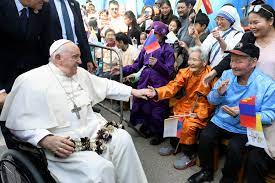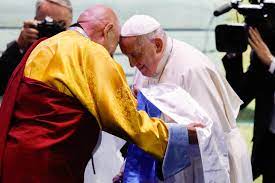Pope Francis, the leader of the Catholic Church, recently spoke out against conservative Catholics in the United States, calling them “reactionary” and expressing his concern about their influence. This marks one of his strongest criticisms of these influential figures who have been critical of his leadership for over a decade. The Pope’s comments were made during a meeting with fellow Jesuit priests in Portugal, where one priest shared his surprise at the anger directed towards Francis during his time in the United States.
Pope’s Critique
In response, Pope Francis shared his perspective, emphasizing that the loudest voices in American Catholicism are “backward-looking” moralists who are disconnected from the roots of the church. He believes that Catholic tradition and history should be about progress and adapting to live by the teachings of the Gospel in the present. The Pope’s words were candid but not entirely surprising given the ongoing tension between his more modern approach and the conservative elements within the church.
Historical Context
This tension between the Vatican and the U.S. church has deep historical roots. Since the United States’ founding, popes have viewed the American democratic experiment and the separation of church and state with suspicion, fearing harm to souls and society. Periodically, the Vatican has criticized American ideas like “Americanism” and “modernism.” After the Second Vatican Council in the 1960s, the focus shifted to America’s secular cultural influence. Pope John Paul II, during his long papacy from 1978 to 2005, steered the U.S. hierarchy towards conservative theology, assisted by Cardinal Joseph Ratzinger, who later became Pope Benedict XVI.
A Change in Direction
The election of Pope Francis in 2013 marked a significant change. He encouraged American Catholics to be more flexible, pastoral, inclusive, and less doctrinally rigid. This reversal is historic, as Rome is now the driver of reform. Pope Francis is a global leader in addressing climate change, economic injustice, and the treatment of migrants. He emphasizes the universal right to health care, housing, and decent jobs. While he shares his predecessors’ opposition to abortion, he sees it as part of a broader Catholic teaching on protecting and promoting life. In Portugal, he criticized the focus on “sins below the waist” while ignoring exploitation and dishonesty.
Conservative Influence
However, many American church leaders remain focused on what some call “pelvic theology” and are deeply involved in today’s culture wars. This group, represented by the leadership of the U.S. Conference of Catholic Bishops, networks like EWTN, and other influential organizations, wields significant financial resources and media platforms. They see themselves as more Catholic than the Pope, openly criticizing his teachings and questioning his legitimacy. This level of dissent is unprecedented.
Why Now?
Why is Pope Francis speaking out so strongly after being Pope for ten years? One reason is his age; he will turn 87 in December, and while he is strong, he faces health challenges. Additionally, the passing of Pope Benedict XVI last year reduced concerns about offending a former Pope whom Francis greatly admired.
Most importantly, Pope Francis is frustrated. He is constrained by the team he inherited, and opportunities for change come slowly. With thousands of bishops worldwide, he can’t manage them all from the Vatican. The Pope has preferred not to remove those who oppose him, saying, “I don’t cut off heads.” Yet, he must navigate with the team he has, ‘similar to Joe Biden leading with Donald Trump’s Cabinet’ according to one commentator.
The Future of the Catholic Church
Many American conservatives hope that they can wait for the next Pope, expecting a return to conservative values in Rome. However, global Catholicism’s centre of influence has shifted to the Southern Hemisphere, where Pope Francis, the first Latin American Pope, is celebrated. The U.S. church represents just 5 percent of the worldwide Catholic population. Additionally, Pope Francis will appoint 18 new cardinals by the end of this month, which means he will have named the majority of the cardinals who will elect his successor. These new cardinals align more with his pastoral approach and are from countries far from the United States.
Let’s face it, Pope Francis’s recent criticisms in Portugal serve as a wake-up call. They suggest that those who cling to the past may be left behind in the evolving Catholic Church of the future, where Pope Francis continues to promote a more inclusive and progressive vision.
BASED ON MEDIA REPORTS AND AN ARTICLE IN THE WASHINGTON POST



